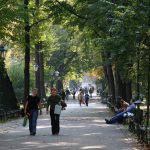 In the Big Sort, author Bill Bishop highlights how over the years, Republicans and Democrats have increasingly sorted themselves into homogeneous communities of like minded people. New research from the University of Washington in St Louis highlights how this is often done along urban/rural lines.
In the Big Sort, author Bill Bishop highlights how over the years, Republicans and Democrats have increasingly sorted themselves into homogeneous communities of like minded people. New research from the University of Washington in St Louis highlights how this is often done along urban/rural lines.
The researchers analyzed survey data from Gallup from 2003-2018, and found clear evidence of a urban-rural political divide. The data showed that the proximity to cities of at least 100,000 people, and the population density of that city, played a huge role in the political beliefs and the partisan affiliation of people.
“Urban-rural differences in partisan political loyalty is as familiar in the United States as they are in other countries,” the researchers say. “The general consensus has been that the origins of this divide lie within the personal characteristics of the people who live in rural or urban communities. However, our research found that the explanation was not that simple.”
Partisan divide
The data showed that the chances of someone voting for democrat dropped by 12% if they lived in a rural area (after accounting for individual characteristics). Similarly, those living in densely populated urban areas were 11% more likely to vote Democrat, and identify themselves strongly in that direction.
“On the one hand, our findings should not surprise anyone. Life experiences shape our perceptions of the world. On the other hand, we tend to overlook how the social environment—outside of race, gender, and income—plays a role in our partisan identity,” the researchers explain. “And that is the main takeaway from our research. The environment around us—the distance we live away from a metropolitan area and population density—shapes what we think about the political world and the partisan labels we adopt.”
In terms of the precise distance, the data suggests that Republicans live, on average, 20 miles from a city, with independents in a 17 mile radius, and Democrats within a 12 mile radius. This gap did appear to be smaller among those with higher income and education, however, with degree educated Republicans living just 17 miles from the city, and Democrats just 10 miles. The distances were also lower for ethnic minorities, with both Hispanic Republicans and Democrats living significantly closer to the city.
There has been a long tradition of small towns being conservative strongholds, with inhabitants often having traditional values that make change difficult.
“In rural, less populated areas, residents are more likely to know one another and talk with their neighbors. Those interpersonal relationships are highly influential and can create a social pressure to conform,” the researchers say. “There also is a lot of resentment on the part of rural residents toward urban communities. There is a common perception that cities receive more than their fair share of resources and look down on rural communities. The media helps enforce these beliefs with news coverage that predominantly focuses on big cities and the interests of urbanites.”
By contrast, large cities have traditionally veered towards a more liberal outlook that renders people open to unconventional ideas and behaviors. This is in large part because they are exposed to a more diverse range of people, which fosters tolerance.
Political views
What is somewhat less clear is whether people move to areas that reflect their existing political views, or whether places help to form the political views of inhabitants. The researchers believe the latter to be the case.
“There is a striking and significant association between geography of residence and party identification,” the researchers explain. “In both urban and rural settings, geography and population density seem to exert a socializing impact on partisan identification while perhaps also serving as a draw for movers seeking a fitting and compatible destination.”
It’s a finding the team believe has important implications for the upcoming election, and even further into the future. They explain that it’s long been known that Democratic voters move to cities, but this is inefficient in the current electoral system in terms of winning seats.
“By virtue of how we elect our members of Congress and even our president, Democrats are at a disadvantage, and it might only get worse based on the type of campaigning we see going in the primaries,” they continue. “Many of the Democratic candidates are leaning further to the left. This is not going to win over the rural voters who are more resistant to progressive ideas. The Democratic party is going to be at an increased electoral disadvantage if they decide they want to be the party of the urban progressive.”